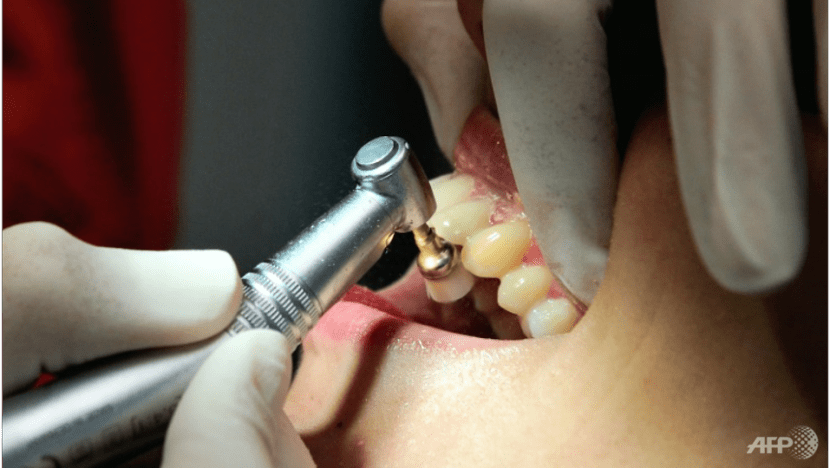Coroner rules medical misadventure in case of woman who died after wisdom teeth extraction

Third molars, or so-called wisdom teeth, generally emerge fully or partially between ages 17 and 26 into limited space and they are often wedged against the second molars. (AFP/Philippe Huguen)
SINGAPORE: A woman died aged 24 following the extraction of four wisdom teeth after experiencing a rare case of malignant hyperthermia, a life-threatening reaction that occurs due to certain agents used during general anaesthesia.
In findings made available on Monday (Oct 3), a coroner ruled the death of Ms Toh Yi Lin an unfortunate medical misadventure.
The court heard that Ms Toh was first seen at the National Dental Centre Singapore (NDCS) on Aug 8, 2018, after being referred there from Ang Mo Kio Polyclinic. During a review at the NDCS on Apr 23, 2019, she complained of severe, radiating pain in the upper and lower right side of her mouth.
Examinations suggested that the pain could be due to an impacted wisdom tooth or a necrotic tooth. Ms Toh also had three other impacted wisdom teeth which were assessed to potentially cause more pain, swelling and infection.
Ms Toh chose to undergo surgery under general anaesthesia to remove her four impacted wisdom teeth. She had no known drug allergy and had undergone two uneventful surgeries under general anaesthesia previously.
On May 8, 2019, Ms Toh was admitted to a ward and a nurse ran through a checklist to assess her general condition, drug allergies and other facets of her medical history. Nothing out of the ordinary was noted, and the anaesthetist for the surgery went through a pre-anaesthetic assessment with Ms Toh.
At about 8.20am, Ms Toh was taken into the operating theatre. The anaesthetist took a set of vital signs before administering the general anaesthesia and they were normal.
After Ms Toh went to sleep, she was intubated through the nose, a standard intubating procedure for dental surgery. The oral and maxillofacial surgeon performed the surgery and removed all four impacted wisdom teeth.
The surgery was uneventful for the first 90 minutes. However, just before the surgery was completed between 10am and 10.15am, Ms Toh showed signs of mild hypercapnia, or a rise in the concentration of carbon dioxide.
The surgery was completed at 10.20am and the operation sites sutured, with the anaesthetic gas discontinued. Ms Toh's mild hypercapnia began increasing in severity and she showed reduced oxygen saturation.
She was given oxygen ventilation, but did not wake up at 10.30am despite discontinuation of the anaesthetic gas, and had a fever of 42 degrees Celsius. Another anaesthetist came to help, and an ambulance was called for.
Despite efforts to resuscitate Ms Toh, she died at 1.31pm that same day.
An autopsy certified her cause of death as consistent with malignant hyperthermia. This is a life-threatening reaction that occurs due to certain anaesthetic agents used during general anaesthesia, including inhaled anaesthetic agents or succinylcholine. It can occur after a single exposure or multiple exposures and may manifest at any time during anaesthesia.
It usually manifests as elevated carbon dioxide levels, muscle rigidity, hyperthermia or raised body temperature and tachycardia. Individuals can be more susceptible to malignant hyperthermia due to certain inherited genetic mutations.
No other anatomical or toxicological causes of death were detected.
During the coroner's inquiry, the dental officer at NDCS who reviewed Ms Toh answered the question of whether it was appropriate for Ms Toh to remove all four wisdom teeth at one go instead of one or two at a time.
Dr Jody Hong stated that a dentist recommends the removal of teeth that have clinical indication for removal. She explained that she had a discussion with Ms Toh and her mother on the option of removing the four teeth.
She explained that if a patient was planning to remove all four wisdom teeth eventually and was keen on general anaesthesia, she would usually advise the patient to consider doing it in one surgery rather than go through general anaesthesia multiple times, as it comes with its own set of risks.
With Ms Toh, Dr Hong told her she had the choice of using local or general anaesthesia. She also explained the general risks of wisdom tooth surgery, which include the risk of permanent numbness to the lip, chin and tongue.
Ms Toh chose to remove all four wisdom teeth under general anaesthesia after discussing her options with her mother, after mentioning she had previously had surgery under general anaesthesia.
Based on Ms Toh's pre-anaesthetic assessment on the day of the surgery, she had past medical history of high cholesterol, a high Body Mass Index of 30.5 with a weight of 73.5kg and hidradenitis suppurativa, a skin condition. There was no family history of malignant hyperthermia.
Dr Diana Chan Xin Hui, the anaesthetist for Ms Toh's surgery, stated that malignant hyperthermia is a very rare inherited condition due to a gene mutation where there is an adverse response to the inhaled anaesthetic agents.
It causes widespread muscle breakdown and severe physiological dysfunction, causing the heart muscles to break down once it reaches the heart. While it is a rare condition, the death rate is high due to the severity of the reaction. This is a genetic disease occurring 1 in 50,000 in Western populations and is even rarer in Asians, said Dr Chan.
A independent medical expert found that pre-surgical screening was carried out appropriately. The response to the complications arising at the end of the surgery was also adequate and in accordance with established protocols for such cases.
The coroner said there is no basis to suspect foul play and conveyed her condolences to Ms Toh's family for their loss.














